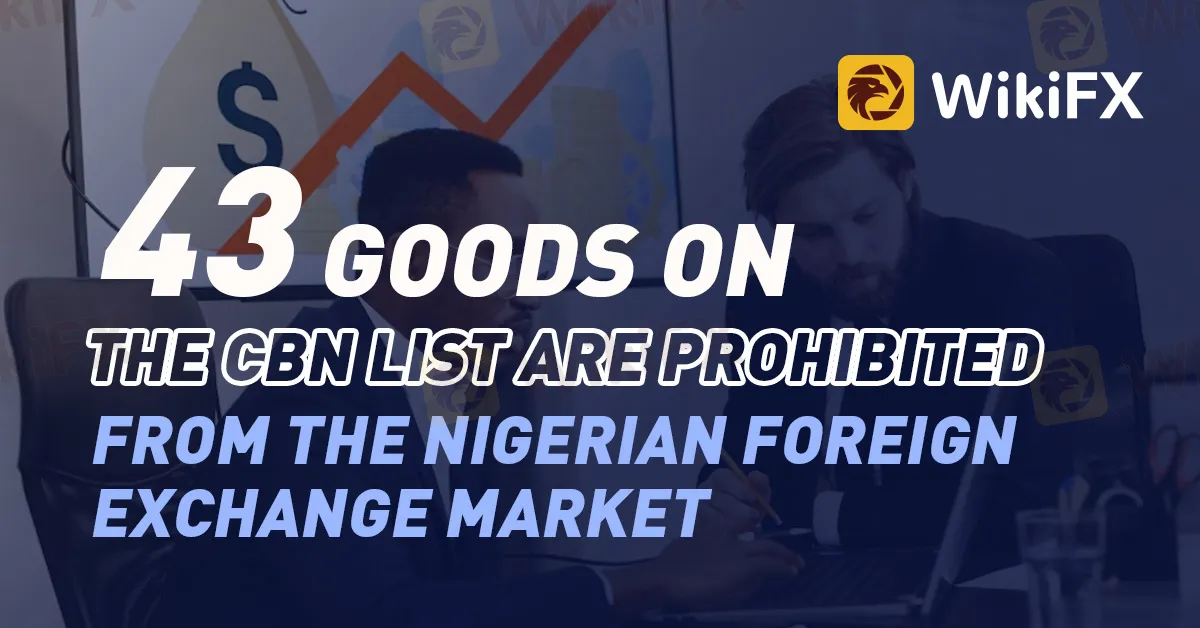简体中文
繁體中文
English
Pусский
日本語
ภาษาไทย
Tiếng Việt
Bahasa Indonesia
Español
हिन्दी
Filippiiniläinen
Français
Deutsch
Português
Türkçe
한국어
العربية
43 GOODS ON THE CBN LIST ARE PROHIBITED FROM THE NIGERIAN FOREIGN EXCHANGE MARKET
Abstract:The 43 non-eligible commodities that were banned from the FX market at the direction of CBN Governor Godwin Emefiele are still prohibited, according to the Central Bank.

The 43 non-eligible commodities that were banned from the FX market at the direction of CBN Governor Godwin Emefiele are still prohibited, according to the Central Bank.
The purchases cannot be funded through the I & E window. Here is the list.
This is in accordance with the information provided in the central bank's Q&A document outlining the recent operational changes to the forex market.
This demonstrates that the central bank will keep enforcing the 43-item ban, indicating that the government would keep using import substitution to safeguard the local economy.
The Nigerian central bank released a list of imported products and services that will not be accepted as payment for foreign exchange in the country's foreign exchange market in a circular dated June 23, 2015.
The list was published “in the continuing effort to sustain the stability of the foreign exchange market and ensure the efficient utllization of foreign exchange and the derivation of optimal benefits from goods and services imported into the country,” the central bank said in a statement at the time.
It went on to say that in order to promote domestic manufacturing of these goods, importers of specific goods and services have to be denied access to foreign currency at Nigeria's foreign exchange markets.
In exchange, the central bank anticipated that the policy would aid in the preservation of foreign reserves, make it easier to revive domestic industry, and increase job creation.
When the list was first made public, it had 41 items; however, the central bank added two more.
The debate about whether or not this policy has been successful has persisted for eight years. We present a list of the 43 items that are unreadable for accessing Nigeria's forex market in response to requests from our readers.
1. Rice
2. Cement
3. Margarine
4. Palm Kernel/Palm oil products/vegetable oils
5. Meat and Processed Meat Products
6. Vegetables and Processed Vegetable Products
7. Poultry – chicken, eggs, Turkey
8. Private Airplanes/Jets
9. Indian Incense
10. Tinned Fish In sauce (Gelsha)/Sardines
11. Cold Rolled Steel Sheets
12. Galvanized Steel Sheets
13. Roofing Sheets
14. Wheelbarrows
15. Head Pans
16. Metal Boxes and Containers
17. Enamelware
18. Steel Drums
19. Steel Pipes
20. Wire Rods (deformed and not deformed)
21. Iron Rods and ReInforcina Bars
22. Wire Mesh
23. Steel Nalls
24. Security and Razor Wire
25. Wood Particle Boards and Panels
26. Wood Fiber Boards and Panels
27. Plywood Boards and Panels
28. Wooden Doors
29. Furniture
30. Toothpicks
31. Glass and Glassware
32. Kitchen Utensils
33. Tableware
34. Tiles – vitrified and ceramic
35. Textiles
36. Woven Fabrics
37. Clothes
38. Plastic and Rubber Products, Cellophane Wrappers
39. Soap and cosmetics
40. Tomatoes/Tomato Pastes
41. Euro bond/Foreign Currency Bond/Share Purchases
42. Milk
43. Maize
Although there are 43 items on the list, each one contains a number of additional sub-items that were recorded by Nigerian Customs using their import codes list.
The things on the list above are not always prohibited from importation. They are only forbidden from using the official investor and exporter window to access foreign exchange.

Disclaimer:
The views in this article only represent the author's personal views, and do not constitute investment advice on this platform. This platform does not guarantee the accuracy, completeness and timeliness of the information in the article, and will not be liable for any loss caused by the use of or reliance on the information in the article.
Read more

WikiFX Review: Is IVY Markets Reliable?
IVY Markets, established in 2018, positions itself as a global brokerage offering a diverse range of trading instruments, including Forex, Commodities, Cryptocurrencies, and Stocks. The platform provides two primary account types—Standard and PRO—with a minimum deposit requirement of $50 and leverage up to 1:400.

Germany's Election: Immigration, Economy & Political Tensions Take Centre Stage
Germany is set to hold a crucial general election on 23 February 2025, with voter frustration over migration emerging as a dominant issue.

ED Exposed US Warned Crypto Scam ”Bit Connect”
The Indian Enforcement Directorate (ED) recently exposed a crypto Scam from a firm called Bitconnect. During the investigation, which took place on February 11th and 15th, 2025. The authority recovered bitcoin worth approximately Rs 1,646 crore & Rs 13.50 Lakh in cash, a Lexus car, and digital devices. This investigation was conducted under the provisions of the Prevention of Money Laundering Act (PMLA) of 2002.

XTB Secures Chilean License, Expands Latin America Footprint
XTB gains a securities agent license in Chile, boosting its Latin America presence. The broker plans to offer stocks, ETFs, and derivatives to local investors.
WikiFX Broker
Latest News
Germany's Election: Immigration, Economy & Political Tensions Take Centre Stage
WikiFX Review: Is IVY Markets Reliable?
eToro Adds ADX Stocks to Platform for Global Investors
Why Do You Keep Blowing Accounts or Making Losses?
B2BROKER Launches PrimeXM XCore Support for Brokers
Checkout FCA Warning List of 21 FEB 2025
Google Bitcoin Integration: A Game-Changer or Risky Move?
IG 2025 Most Comprehensive Review
Why Should Women Join FX Market?
ED Exposed US Warned Crypto Scam ”Bit Connect”
Currency Calculator






